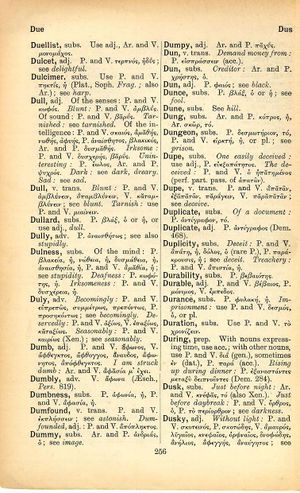during: Difference between revisions
From LSJ
ἔνδον γὰρ ἁνὴρ ἄρτι τυγχάνει, κάρα στάζων ἱδρῶτι καὶ χέρας ξιφοκτόνους → yes, the man is now inside, his face and hands that have slaughtered with the sword dripping with sweat
(CSV4) |
m (Woodhouse1 replacement) |
||
| Line 1: | Line 1: | ||
{{Woodhouse1 | {{Woodhouse1 | ||
|Text=[[File:woodhouse_256.jpg|thumb|link={{filepath:woodhouse_256.jpg}}]] | |Text=[[File:woodhouse_256.jpg|thumb|link={{filepath:woodhouse_256.jpg}}]] | ||
With nouns expressing time, use acc.; with other nouns, use P. and V. διά (gen.), sometimes ἐν (dat.), P. [[παρά]] (acc.). | ===preposition=== | ||
With nouns expressing time, use acc.; with other nouns, use [[prose|P.]] and [[verse|V.]] [[διά]] (gen.), sometimes ἐν (dat.), [[prose|P.]] [[παρά]] (acc.). | |||
[[rising up during dinner]]: [[prose|P.]] [[ἐξαναστάντες μεταξὺ δειπνοῦντες]] ([[Demosthenes|Dem.]] 284). | |||
}} | }} | ||
Revision as of 08:56, 20 May 2020
English > Greek (Woodhouse)
preposition
With nouns expressing time, use acc.; with other nouns, use P. and V. διά (gen.), sometimes ἐν (dat.), P. παρά (acc.).
rising up during dinner: P. ἐξαναστάντες μεταξὺ δειπνοῦντες (Dem. 284).

